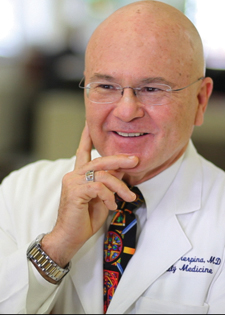 BY VICTOR S. SIERPINA, MD, ABFM, ABIHM, Director, Medical Student Education Program, WD and Laura Nell Nicholson Family Professor of Integrative Medicine, Professor, Family Medicine University of Texas Distinguished Teaching Professor
BY VICTOR S. SIERPINA, MD, ABFM, ABIHM, Director, Medical Student Education Program, WD and Laura Nell Nicholson Family Professor of Integrative Medicine, Professor, Family Medicine University of Texas Distinguished Teaching Professor
Norman Vincent Peale, one of the early exponents of the power of positive thinking said something like this about aging:
“Aging of itself does not bring disease and disability, but it is the belief that it does which brings about these conditions.”
He also said, “Live your life and forget your age.”
Peale, whose work was often referred to as “the gospel of optimism” lived to a healthy age of 95, demonstrating the effects of his beliefs.
As I gather days and years, I often reflect on Peale’s words and wonder if they are really true?
Can belief truly turn the tide? Can positive expectations and a positive attitude alter our physical outcomes?
Dr. Ed Diener an emeritus professor at the University of Illinois, my alma mater, spent much of his career studying the science of happiness. He decided that rather enough research was already being done on depression and that more studies were needed on happiness. His work was illustrated in a wonderful documentary movie, “Happy” and showed, among other things, that increased wealth did not increase happiness but had, in fact, the opposite effect.
Once we are beyond meeting life’s basic necessities, increased accumulation of wealth was negatively correlated with happiness. Some of the happiest people he interviewed were those for whom relationship and community were pre-eminent despite meager and sometimes marginal living situations. And those who characterized their lives as happy clearly gained a longevity advantage.
This was in line with findings in a recent book by science writer Marta Zaraska called, Growing Young. She identified the power of many social determinants in our longevity.
In this work she reports the eye-popping significance to improving our longevity that friendship, optimism, and relationships bring. Raised by her Polish father who strongly modeled and encouraged close attention to preventive hygiene, exercise, and organic diets, she spent much of her life following the latest recommendations for good health. These included yoga, tai chi, organic foods, increasing vegetable and fruit intake, various diets, intermittent fasting, meditation, and more.
Her book puts into perspective that social determinants of health weigh heavier on the scale of positive health and improved longevity than many of these well-known and evidence-based lifestyle practices.
Here are a few examples from Growing Young with side-by-side comparisons of practices that that promote longevity and lower early mortality:
| Exercise | -33% to -23% | Happy marriage | -49% |
| Fruits and vegetables (6 or more servings a day): | -26% | Large social network: | -35%
|
| Mediterranean diet: | -21% | Living with someone
|
-19% to -32% |
| Being overweight
(BMI 30-35) |
-6% | Volunteering
|
-22%
|
Surprised? I was. Relationships and community involvement make as big or bigger differences than our usual practices for lifestyle change and improvement of health risks. A stronger focus on relationship- building can more than offset less gym time or the latest diet.
It may turn out that one of the greatest hazards of COVID is from loneliness, which is estimated to reduce our longevity by 28%, or equivalent to smoking a half a pack of cigarettes daily. Our forced lockdowns, isolation in our homes, decreased social connectedness with friends and family can take a heavy toll on our health. Seniors already isolated in long-term care facilities are further at risk by lack of contact with family members. This likely contributes to the disproportionate share of COVID deaths in nursing homes.
On the happy side, Growing Young shows how a broad range of impacts from laughter, to improving our attitude, to volunteering, to being kind, being optimistic, and building relationships all add up to increase our longevity.
Another domain for growing young is lifelong learning. Researchers at the Center for Vital Longevity at the University of Texas found that adults between 60 and 90 who engaged in learning a new skill had larger improvements in cognition, memory, and processing speed than a control group that just met and socialized. Learning a new skill like juggling, chess, a language, a musical instrument, swimming or others helps older adults in many of the same ways that learning to walk help infants. Fall down, get up again, keep trying. As you do, new activities foster the brain in rewiring and connecting in more complex ways. See Tom Vanderbilt’s new book, Beginners: The Joy and Transformative Power of Lifelong Learning for more detail.
To close with another Norman Vincent Peale quote:
“The way to happiness: Keep your heart free from hate, your mind from worry. Live simply, expect little, give much. Scatter sunshine, forget self, think of others. Try this for a week and you’ll be surprised.”


